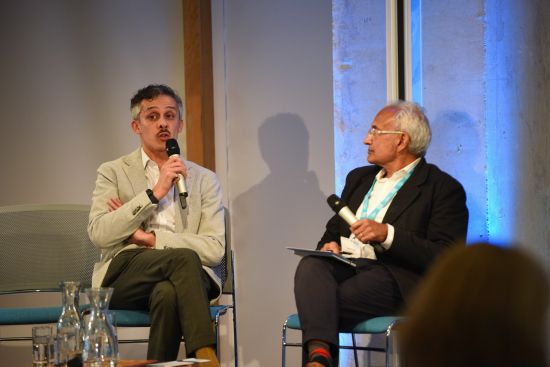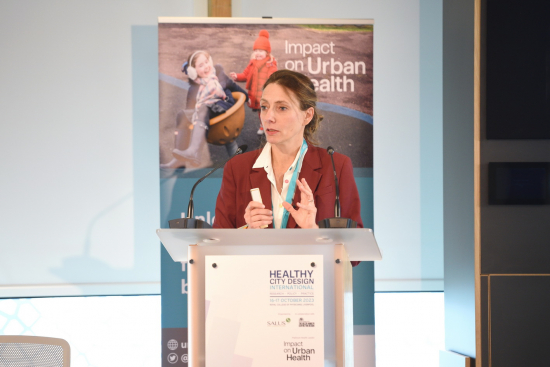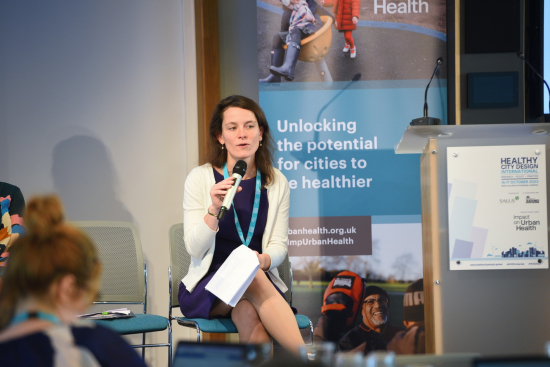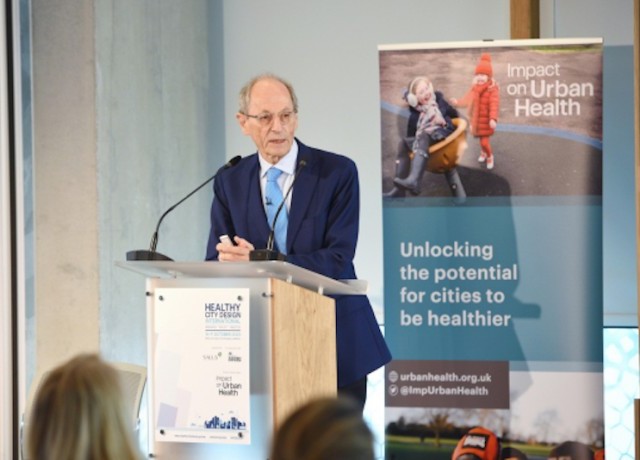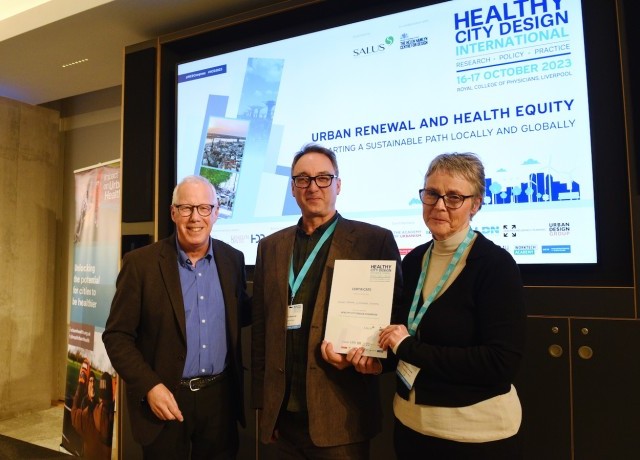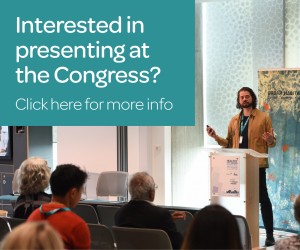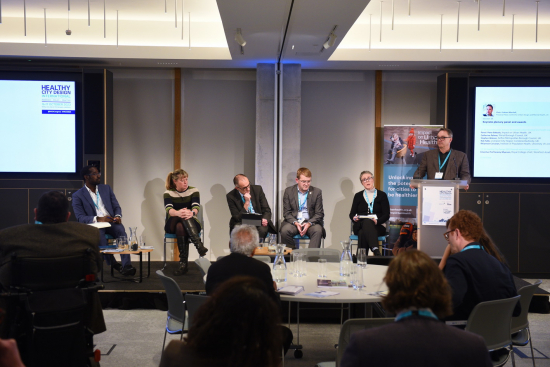
Keynote summary: How to make Liverpool a healthy city – creating and sustaining change
Closing this year’s Healthy City Design International Congress in Liverpool, an expert panel of local and national research and policy leaders in urban design, regeneration and health, chaired by Graham Marshall, director at Prosocial Place, offered insights on two days of talks, presentations and workshops, and how the city of Liverpool can improve people’s health, wellbeing and quality of life.
Responding to Marshall’s opening question on what needs to change to make Liverpool a healthy city, Peter Babudu, executive director of Impact on Urban Health, called for the need to be “obsessively collaborative” – a phrase that struck a chord with fellow panellists.
“You’ve got to be flexible and prepared to act at a range of different levels and in a co-ordinated fashion,” he insisted – working with community researchers, working with industry, etc.
Short-term thinking, long-term gain
Rhiannon Corcoran, professor of psychology and public mental health at the Institute of Population Health, University of Liverpool, said the pace of change needed to accelerate, and she linked this to a need to shift away from the pre-occupation with GDP and economic growth and give greater focus to a “wellbeing economy”.
“The pace of change is linked in with the short-term nature of national government, and the way these things change so quickly when we know that the social determinants of health take a long time to have an impact,” she said. Policies aligned to a wellbeing economy and how cities engage in such economies need to take precedence over traditional growth models focused on “short-term economic gain and profit and capital, and so on”.
Stephen Watson, executive director (place) of Sefton Metropolitan Borough Council, was not as forthright in criticising the dominance of GDP and growth, but he nevertheless underlined the importance of focusing on “inclusive growth”. Everything the Council is doing across the borough is, according to Watson, rooted in creating quality employment and career opportunities.
“We didn’t buy a shopping centre because we’re excited about the future of retail and we see a financial return,” he said, “we did it so that we can deliver something that creates a quantity and quality employment opportunity in our places that supports the retention of talent, the adjacent investment, trying to do the things that catalyse investment, creating town centres that people want to invest in and lease offices in – a place to work, a place to live, and a place to be proud of.”
For Robb Tabb, senior policy lead at Liverpool City Region Combined Authority, the question is one of mentality. He argued that cities and stakeholders need to be intentional on what they need to do and shouldn’t get downhearted when change seems a long way off. Understanding that the journey isn’t linear but knowing your destination is vital, he said, and he stressed the need, too, to always do something, however small, and “bank that marginal gain”.
Cathy Palmer, head of regeneration at Wirral Council, called for the business case process to have broader parameters, to open up the funding systems and allow development projects to reach their potential. She also emphasised the need to harness the strength of the community. “Understanding the role that the community can have in improving the health outcomes in a place like Birkenhead is the key to its potential,” she said.
Many of the problems and challenges we face are beyond the wit and ability of one organisation to respond to. We’re only going to do it if we do it together
Barriers to change
Flipping the question about what needs to change on its head, Marshall than quizzed the panellists on what needs to stop happening to enable change to occur. Picking up on Palmer’s lament on the funding system, Watson likened the process to the Hunger Games, where worthy development projects are pitted against each other to fight over the same pot. “It’s counter-productive,” he said. “Instead of doing, we’re chasing.”
He also highlighted the need to stop politicising some of the language and called for a more intelligent conversation. Using the example of 15-minute cities, he said: “So, 15-minute cities become a deprivation of liberty issue. Active travel and safer places to walk and cycle become a war on the motor car. That’s simply not the case. The way some people use language and distort the conversation distracts from progress on really important opportunities for our towns and cities.”
Recognising that much of the country has endured a difficult period for a decade or longer, Prof Corcoran stressed the need to be bold and not allow money and finance to be a barrier. “We have health crises all over the place, combined with a climate crisis,” she reflected. “These are existential crises and therefore we need to be bold; we need to be thinking big and back the things that will make an impact. Funding and lack of funding can no longer be a reason not to do something. I don’t know how we manage to achieve that, but we need to do it in spite of where we are.”
Tabb reiterated his earlier comment about doing something, whatever it may be and regardless of whether it gives a reward of, say, 0.5 per cent or 25 per cent. He also emphasised the need to pool resources: “Don’t think you have to do it all yourself. Many of the problems and challenges we face are beyond the wit and ability of one organisation to respond to. We’re only going to do it if we do it together.”
Palmer highlighted the need for prevention and embedding good health at an early age, citing the need to stop nurturing children with unhealthy diets and lifestyles. And elaborating on this point, Babudu said there is a need to recognise that certain sectors, including food, or urban environments often frame some of the choices available to people. “We need to stop and challenge that, and look at the systemic nature of these issues,” he said.
 Peter Babudu, executive director of Impact on Urban Health
Peter Babudu, executive director of Impact on Urban Health
Sustaining change
Finally, the panel offered some thoughts on how positive change might be sustained. Prof Corcoran highlighted the need to democratise the vision and harness the power of real people’s voices. “How do you do that?” she said, “well, you communicate it broadly. You identify the destination and agree some aims and objectives. We need to become a force for change and a network that extends beyond our own cities; we need to produce people who can bridge between those cities and create a national movement.”
The three council representatives highlighted similar aspects linked to Babudu’s earlier remark around “obsessive collaboration” – the ongoing conversation; doing things with communities, not to them; creating a groundswell of opinion; celebrating success; speaking different people’s languages in order to gain greater influence and engagement; and having a vision that everyone can get behind through inspirational projects and people.
Babudu echoed the need for decisions and conversations to be rooted in the communities where people would be impacted, and the need to take the community’s views into account. Using the example of low-traffic neighbourhoods, which can be a politicised issue, such an approach to engagement can provide policymakers with information on where there are gaps in understanding within the community, in terms of the purpose of schemes, timescales, etc.
“You can achieve greater resilience in policy changes if you take on the ideas of those who are impacted by it,” said Babudu, “and then you can weather these political storms so much better.”
Event news
Investing in urban renewal and health equity
21st March 2024
Health equity: Marmot Cities
20th March 2024
Housing and health equity
20th March 2024



